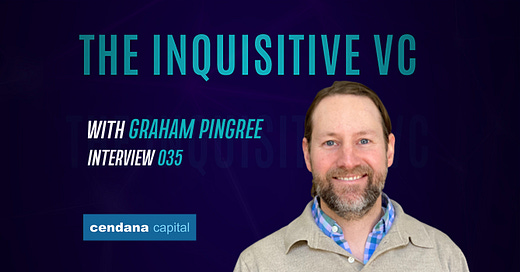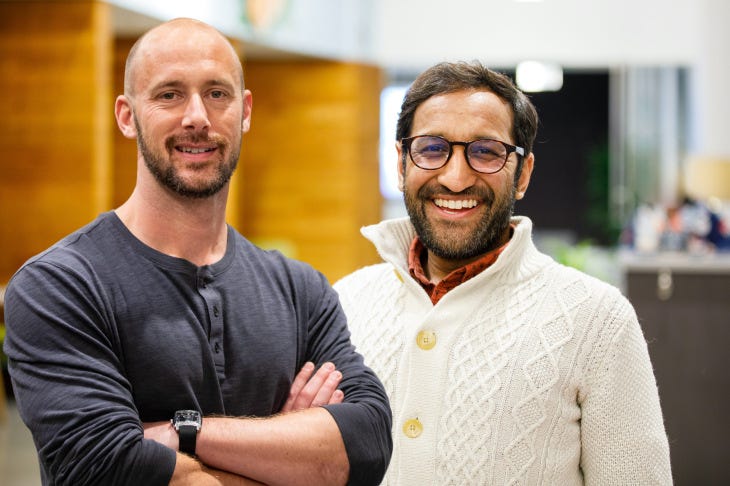Graham Pingree - Cendana Capital
We talk about his journey to VC, rolling funds, problems in the LP community and Cendanas investment in Better Tomorrow Ventures!
Graham Pingree is a Partner at Cendana Capital, a fund of funds that invests in early stage VC funds globally. Previously he spent time at Horsely Bridge and Cambridge Associates and is known as one of the most helpful LPs in the business.
We talk about his journey to VC, rolling funds, problems in the LP community and Cendana’s investment in Better Tomorrow Ventures!
NA: Thanks for joining me Graham, it would be great to start with your entry into the world of venture capital?
GP: Sure, I started right out of undergrad in the investment space. I've been an Economics major, in college and interned at a firm, headquartered here in Boston called Cambridge Associates. They're an investment advisor for many of the top endowed non-profits around the globe. A lot of colleges, universities and foundations use them to help with asset allocation as well as manager selection.
I spent three years there. Most of my clients were large and had substantial non-marketable allocations a lot of, venture capital and private equity leveraged buyout funds.
It was my first entree into the venture space and I got to see it a little bit from the perspective of institutional limited partners. I did some fund evaluation of early-stage venture firms, it was something I really enjoyed and the next logical step for me was to move on to a fund of funds and do more primary investing directly into funds.
After three years at Cambridge Associates, I moved from Boston out to San Francisco in 2004, and I joined Horsley Bridge Partners, which was one of the very first venture and private equity fund of funds. I spent a couple of years based in their San Francisco office.
Mostly covering the big brand Sandhill Road venture firms. Small and seed funds were an emerging category at the time. Mike Maples was raising his first fund before it was called Floodgate, and Steve Anderson similarly was raising Baseline.
We covered that part of the market as well, and candidly that was the space that I found the most interesting. It was the very earliest stage, investing out of very small funds, it seemed like it had the highest alpha potential relative to some of the bigger, more mixed-age vehicles. That’s really where I fell in love with the seed part of the market.
NA: You have been with Cendana for over six years now, how different was that shift to working for a specialist early-stage fund of funds compared to the likes of Horsley Bridge and Cambridge Associates?
GP: It's been fantastic. As someone considering where to build their career, if you can find something that's niche and focused on the part of the market that you're most interested in, it can be a fantastic fit. I think if I was at a fund of funds that only focused on mid-market buyout firms, it probably wouldn't be as good a fit for me, but the small seed funds are really the most compelling part of the market for me
The specialization and discipline have been a real point of emphasis at Cendana and really is aligned with what I want to do in my career. It's been great. What the specialization has allowed us to do is establish this brand, by focusing exclusively on small funds investing very early we've really been able to build a name for ourselves in that space. It's been really rewarding.
NA: When you're looking at first-time fund managers, what are some of the crucial areas where they fail to impress you?
GP: First-time funds are necessarily a little bit more challenging to evaluate. There isn't typically a super mature track record to perform our typical quantitative diligence on. I think we spend a lot of time thinking about founder market fit; Does this GPs background and domain expertise lend itself to the strategy that he or she is pursuing?
I think where we can't see this really strong fit, that's where it's hard for us to get excited. As a random example, if someone is coming from a med device background and is launching a crypto fund if there's not a really clear way that we can understand how someone's background and network are going to translate into superior deal flow, access and the ability to win deals, I think it's hard for us to get excited about that.
NA: With the recent introduction and rise of rolling funds how do you see that playing out as an LP? Would an institutional investor like Cendana invest in a rolling fund?
GP: Good question, and its something we spent a lot of time thinking about. My market observation is, and I'll caveat this with, we're still getting up to speed on rolling funds and the exact structure. I think that hypothetically it could really democratize access to building a venture track record.
Historically, one of the barriers to trying to institutionalize as an investment manager is you have to have some type of track record. Sometimes that comes because you worked at another venture fund and there's some type of attribution, but often it's people investing off their own balance sheet and building an angel track record and using that to try and professionalize and become a fund manager.
Obviously that only works if you have a balance sheet to support angel investing. I think the idea behind a rolling fund where someone could leverage their personal brand, experience and network to raise capital to start to build a track record. I think that's interesting.
I think if anything, it's going to accelerate the potential for new market entrance as far as raising funds, because, they’ll be able to build a track record in a way that wasn't possible for them previously.
As far as whether we'd consider backing a rolling fund, right now our answer is no. We just can't quite get our heads around the structure in terms of how portfolios are planned for, particularly with regard to reserves.
If every quarter or year is treated as a separate entity, how do you reserve capital to participate in pro-rata of a subsequent round out of a rolling fund? The other question is around how the carry is paid out and how the fee structures work.
It looks to us like it's a series of SPVs, which feels like a deal by deal carry versus investing in a blind pool over multiple years. That I would say is something that institutional limited partners are going to have trouble getting comfortable with.
When we talk to individuals who are excited about the prospect of investing in rolling funds, they like the flexibility and the ability to dynamically adjust allocations over time. The question is just whether that fits in a fund to fund structure and so far we haven't gotten comfortable.
NA: Interesting that you see it as a step towards seeing more emerging fund managers raising larger funds. What would you say are the biggest problems within the LP community today?
GP: Interesting question. Biggest problems within the LP community, I think post-pandemic, I mean, a lot of our job is reading people and investing in teams and evaluating how partnerships dynamics work. That's just incredibly hard bordering on impossible over Zoom, at least in my opinion.
So far evaluating new teams and trying to get a sense of how partners interact and complement each other and build off what the other is saying, is just a real challenge over video. I think we've had the benefit of sitting across the table from teams historically and really watching those conversations in real-time.
I feel like you can sense tension or disagreement, in a way that is just much harder to do over video. I can't claim that every LPs is facing this challenge, some have probably gotten more comfortable, but that's been something that's been top of mind for us post-pandemic. We want to get back to sitting across a conference table from someone so we can get that feel for the partnership a little bit more authentically.
I think a challenge for the limited partner community that's not impacting our little corner as much in the fund to fund structure where we raise capital and then deploy it, I think for some endowments and foundations, is they are figuring out the operating impacts of the pandemic on their core institutions.
I think that that's going to be a challenge for how they think about making illiquid investments in 2021. If all of a sudden an endowment has to support the operating budget, like revenue, tuition, or here in the US, college sports, if that's a significant shortfall, do they have to make up for some of the endowment and how does that impact their ability to make these super illiquid long-term venture capital bets?
I could see that being a real challenge for some endowment models.
NA: Yeah that’s a great point. what's a secret obsession of yours that not many people know about.
GP: A secret obsession of mine, which is fairly public is Boston sports. I'm a huge live music fan, particularly Bruce Springsteen. I would say that’s the thing that I miss the most. I used to go to, I don't know, one or two rock shows a month back when you could do that.
NA: What is the latest publicly announced investment you’ve made?
GP: Yeah, so it was Better Tomorrow Ventures a FinTech focused fund. It's actually an excellent example of a thematic or vertically focused fund where we did a deep dive.
We did some market mapping in the space, we met with a number of fund managers that were targeting financial services technology, and ultimately felt like the most compelling opportunity was this new fund being raised by Jake and Sheel called Better Tomorrow Ventures. We were fortunate enough to have several meetings with the partners before the pandemic hit and we were able to get in a room with them, and really push on how they were thinking about building a partnership and working together.
We were able to get comfortable that this was a compelling team to back. A big part of what we do as part of our diligence is some pretty comprehensive referencing both in the founder community where we really want to talk to folks who've worked with partners previously and hear what the experience has been like and whether they have the credibility to write a lead cheque in the space that they're targeting.
I would say what was unique about Jake and Sheel and Better Tomorrow is from within our own network of GPS that we have supported we had unsolicited a number of very positive references where other seed fund managers said: “Hey, look, we really like working with Jake and Sheel and have a ton of respect for their domain expertise within FinTech. We'll look at anything they bring to us in that space and if we're looking at a deal in FinTech, we want to get their opinion on it.”
I think that lends a lot of credibility because we certainly trust our fund managers take on other investors. That's one of our recent commitments and one that we're really excited about.
NA: Definitely sounds like a great team. Thanks so much for joining Graham, really appreciate your time!
GP: No problem, thanks for having me!







